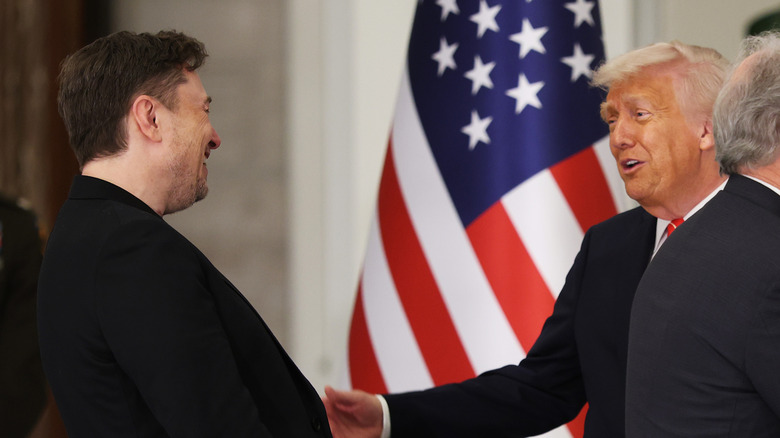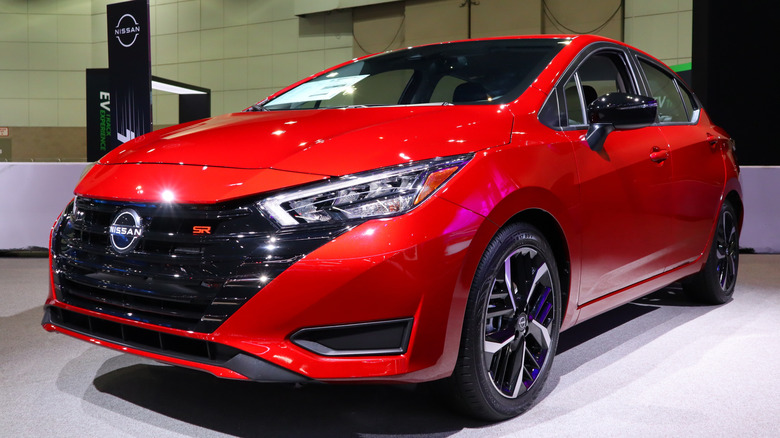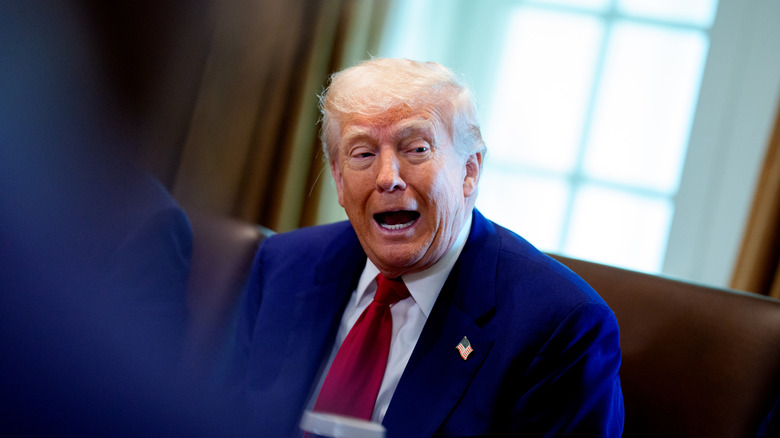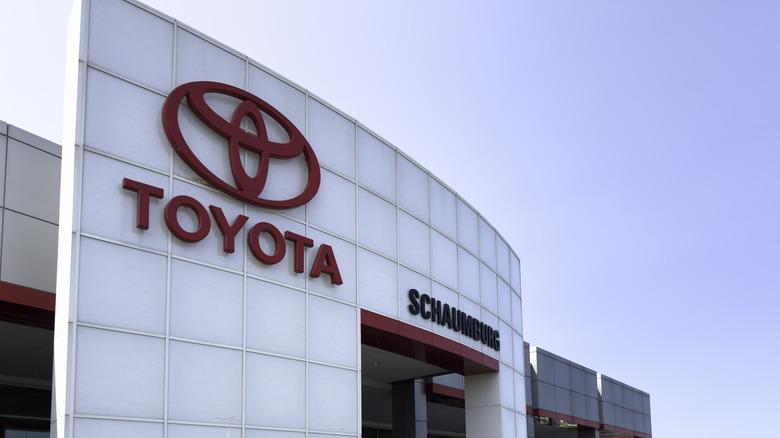
Good morning! It's Thursday, May 29, 2025, and this is The Morning Shift, your daily roundup of the top automotive headlines from around the world, in one place. This is where you'll find the most important stories that are shaping the way Americans drive and get around.
In this morning's edition, Elon Musk says goodbye to the federal government, Nissan says goodbye to the five-speed Versa, German automakers want to make peace with Trump and Toyota can't stop winning.
 Win Mcnamee/Getty Images
Win Mcnamee/Getty Images
All terrible things must come to an end, and that's why billionaire Tesla CEO Elon Musk is officially leaving the Trump administration after months of controversies and infighting. Musk's ultimate goal was to screw up several federal agencies by cutting government jobs with a buzzsaw, but luckily for the institutions our country needs to run properly, Musk mostly failed.
On May 28, a White House spokesperson said his "off-boarding will begin tonight," confirming that Musk was OUT. Earlier this week, he took to social media to thank President Trump as his time as a special government employee with his Department of Government Efficiency came to a close.
I don't think many people will be sad to see him go. From Reuters:
His departure was quick and unceremonious. He did not have a formal conversation with Trump before announcing his exit, according to a source with knowledge of the matter, who added that his departure was decided "at a senior staff level."
While the precise circumstances of his exit were not immediately clear, he leaves a day after criticizing Trump's marquee tax bill, calling it too expensive and a measure that would undermine his work with the U.S. DOGE Service.
Some senior White House officials, including Deputy Chief of Staff Stephen Miller, were particularly irked by those comments, and the White House was forced to call Republican senators to reiterate Trump's support for the package, a source familiar with the matter said.
While Musk remains close to the president, his exit comes after a gradual, but steady slide in standing.
While campaigning and giving hundreds of millions of dollars to Trump's efforts, Musk said DOGE would be able to cut at least $2 trillion in federal spending. I'm sure none of you will be shocked to learn that Musk's lofty promise fell incredibly short. DOGE says its current efforts have saved just $175 billion, and you should really take that number with a massive grain of salt.
Things became frosty for Musk very soon after the President took office on January 20, as Reuters explains:
[S]ome cabinet members who initially embraced Musk's outsider energy grew wary of his tactics, sources said. Over time, they grew more confident pushing back against his job cuts, encouraged by Trump's reminder in early March that staffing decisions rested with department secretaries, not with Musk.
Musk clashed with three of Trump's most senior cabinet members – Secretary of State Marco Rubio, Transportation Secretary Sean Duffy and Treasury Secretary Scott Bessent. He called Trump's trade adviser Peter Navarro a "moron" and "dumber than a sack of bricks." Navarro dismissed the insults, saying, "I've been called worse."
At the same time, Musk began to hint that his time in government would come to a close, while expressing frustration at times that he could not more aggressively cut spending.
In a conference call last month, Musk said he was going to significantly scale back his government work to concentrate on his various businesses that desperately need his attention. He told journalists federal bureaucracy is "much worse than I realized" earlier this week.
As for what happens to DOGE, well, who the hell knows? I suppose it could go on trying to carry out Musk's vision, but without him there, who knows how effective it will be. I mean, it was barely effective with him there 24/7. Fingers crossed it collapses under the weight of its own stupidity.
 Walter Cicchetti/Shutterstock
Walter Cicchetti/Shutterstock
A combination of tariffs on vehicles imported from Mexico and the simple fact that most consumers don't care means the last five-speed manual economy car is dead. That's right, folks. Nissan has halted production of the Mexican-made Nissan Versa manual for the U.S. market. It's a sad day for people who love cars that aren't actually very good.
A spokesperson for the brand told Automotive News that the Japanese automaker plans to focus on the "most popular" Vera trim levels that deliver the "strongest business performance." I suppose the 5-speed Versa, which accounted for fewer than 5% of the 42,589 Versa hatchbacks sold in the U.S. in 2024, didn't meet that criteria.
Of course, this does mean the cheapest new vehicle you can buy in America is now dead. The base five-speed Versa started at $18,330 (including destination), but those days are over. If you want a new Versa — which you don't — you'll have to settle for the CVT. From Automotive News:
The Versa is one of three U.S.-market nameplates Nissan assembles in Aguascalientes, Mexico. The vehicles combined to account for nearly a third of the brand's U.S. volume last year.
On May 13, Nissan projected that President Donald Trump's tariffs could cost the company about ¥450 billion ($3.1 billion) in the fiscal year ending next March.
[...]
In addition to trimming the Versa lineup in the U.S., the automaker is exploring moving Sentra production from Aguascalientes to Canton, Miss.
Although Nissan has not raised sticker prices on vehicles made in Mexico, it has slashed incentive spending on the lower-margin vehicles.
I cannot imagine Nissan's decision to kill the manual Versa in the U.S. was a terribly hard one. I mean, one dealer in the Northeast told AutoNews that it sold just "four or five" manual Versas in all of 2024. On top of the crappy sales, the five-speed Versa hurt Nissan's fleet emissions because it only gets up to 30 mpg combined whereas the automatic car can get up to 35 mpg.
To be fair, this was all going to be a moot point pretty soon regardless. Nissan is expected to kill the Versa nameplate in the U.S. in 2026. I guess if you desperately need a manual Versa, you better act fast.
 Andrew Harnik/Getty Images
Andrew Harnik/Getty Images
BMW, Mercedes-Benz and Volkswagen are in talks with the Trump administration in an attempt to find an import tariff deal. They're apparently using their heavy U.S. investments and exports as leverage to soften what the Administration has planned. The three companies hope that talks with the U.S. Department of Commerce could result in some sort of deal in June. However, a deal could still cost these companies a hell of a lot. Any agreement would probably hinge on them pledging sustainable investments in the U.S. From Reuters:
The automakers have signalled some plans for U.S. expansion since President Donald Trump began making tariff threats.
Mercedes-Benz will add its best-selling GLC SUV to its Alabama plant lineup from 2027, BMW is considering adding shifts at its Spartanburg plant and Volkswagen's Audi is planning to produce some models in the United States, although the brand says that plan pre-dates the Trump administration.
BMW, which has urged the European Union to cut tariffs on vehicle imports from the U.S. to 2.5% from 10%, is the largest U.S. car exporter by volume. Mercedes-Benz also exports heavily from its Alabama plant, its centre of production for SUVs.
Under the ideas being discussed, the three German automakers would get credits for cars they export from the U.S. Those credits would be deducted from tariff costs. I guess we'll see what happens, but given everything we know about this administration, it's going to be a very bumpy ride.
 Patty_c/Getty Images
Patty_c/Getty Images
Toyota says its worldwide output and sales rose for a fourth straight month in April thanks to strong demand for hybrids and a rush of folks buying new vehicles before President Trump's tariffs could really get underway. The Japanese automaker's sales rose 10% year-over-year in April to 876,864 vehicles. That is so many vehicles. From Reuters:
Hybrid vehicle sales made up about 44% of Toyota's total worldwide sales for the first four months of the year.
In April, the Japanese company's global vehicle production rose 8% year-on-year to 814,787 vehicles, lifted by higher production in Japan and markets in North America, South America and China.
The production and sales figures include its luxury Lexus brand.
It's hard to overstate the type of winning streak Toyota is on right now. I mean, even though it's the world's largest automaker, it continues to grow.
We've very much reached the stage of "it's Toyota's world, and we're just living in it."
Never ask a man his salary, a woman her age and Volkswagen what it was doing from 1937-1945.
Don't ask me why, but this Adele song that was released nearly 10 years ago has been stuck In my head for days. Now, it's your turn to share in what I'm going through. I guess it could be worse — the song is fantastic.
















